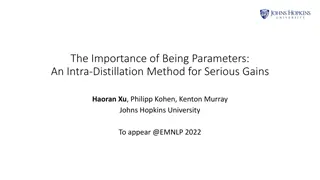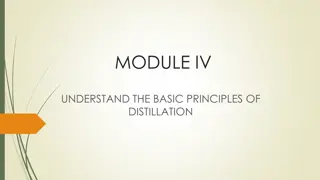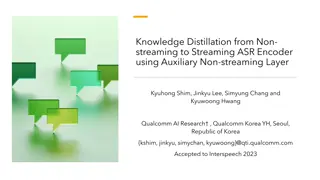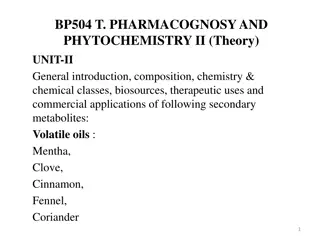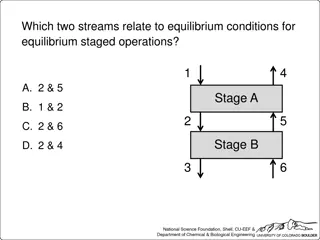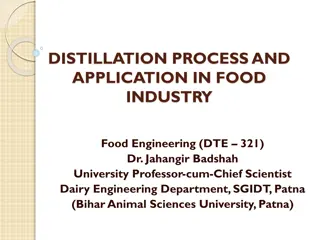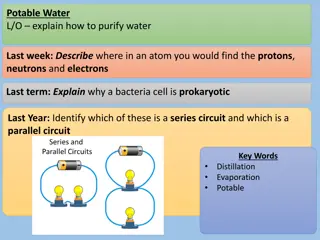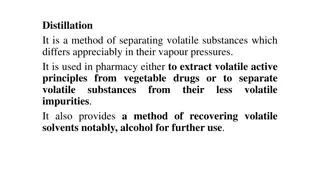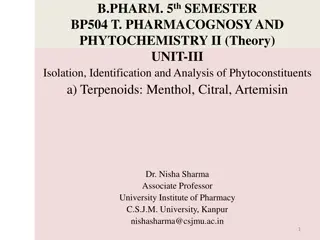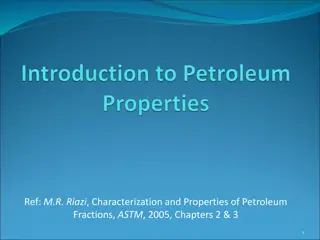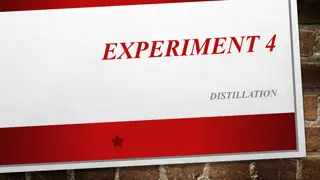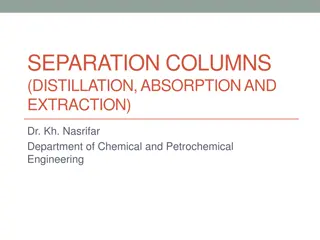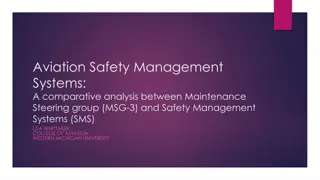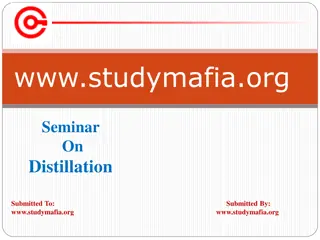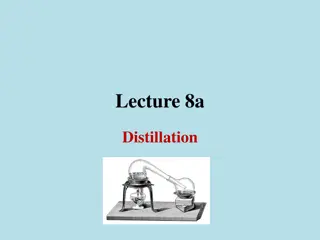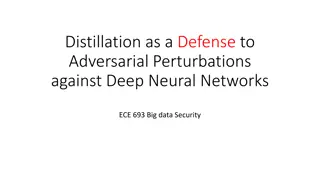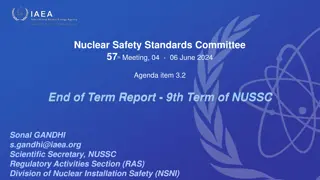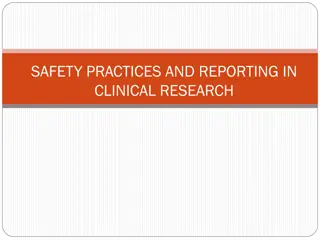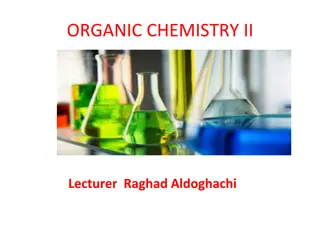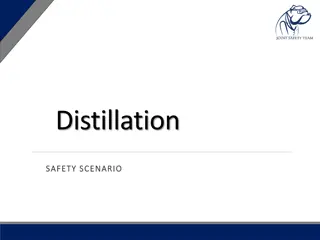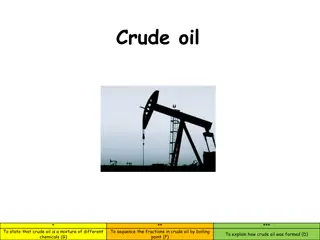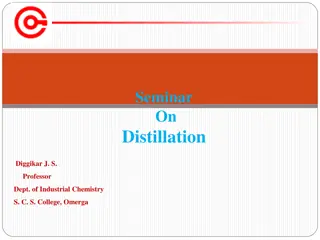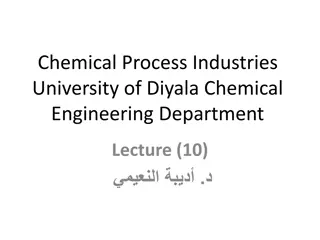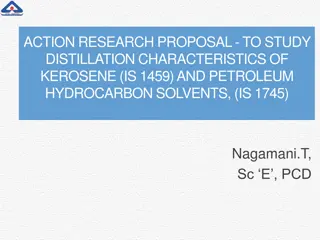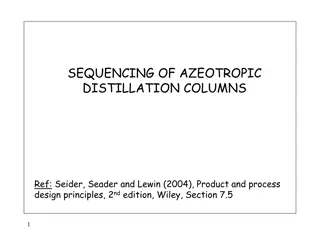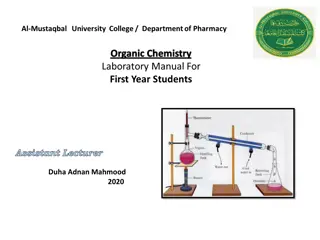SEPARATION COLUMNS
Azeotropic distillation plays a crucial role in the efficient recovery and recycle of organic solvents in the chemical industry. It addresses the challenges posed by azeotropes in separation processes, offering methods like pressure swing distillation and extractive distillation. Understanding the t
0 views • 9 slides
FACILITY MANAGEMENT & SAFETY
Facility management and safety are interlinked disciplines crucial for optimizing workflow and ensuring a safe environment in various facilities. This includes managing space, infrastructure, resources, and staff effectively. Specific focus on laboratory facility management involves maintaining qual
3 views • 19 slides
Safety Health and Welfare.
The Campus Safety, Health, and Welfare (SHW) Committee at TU Dublin is vital for ensuring a safe and healthy environment for all members. Led by Edel Niland, the Senior Manager, the committee focuses on various aspects such as safety arrangements, committee structure, team organization, and safety t
3 views • 21 slides
Intra-Distillation for Parameter Optimization
Explore the concept of parameter contribution in machine learning models and discuss the importance of balancing parameters for optimal performance. Introduce an intra-distillation method to train and utilize potentially redundant parameters effectively. A case study on knowledge distillation illust
8 views • 31 slides
Understanding the Basic Principles of Distillation
Distillation is a process used to separate components in a liquid mixture based on differences in vapor pressures. This involves techniques like simple, steam, and fractional distillation, as well as understanding binary mixtures, boiling points, vapor pressures, and vapor-liquid equilibria. Raoult'
5 views • 42 slides
Knowledge Distillation for Streaming ASR Encoder with Non-streaming Layer
The research introduces a novel knowledge distillation (KD) method for transitioning from non-streaming to streaming ASR encoders by incorporating auxiliary non-streaming layers and a special KD loss function. This approach enhances feature extraction, improves robustness to frame misalignment, and
0 views • 34 slides
Enhancing Safety: People Power SafetySTEP Refresher Training
Explore the comprehensive SafetySTEP Refresher Training program aimed at achieving safety through employee participation, engagement, and proactive safety measures. This training emphasizes creating a culture where safety is a core value, utilizing leading indicators to measure safety successes, and
0 views • 65 slides
Importance of Safety in Construction Business
Ensuring safety in construction projects is crucial for success. Safety measures should be integrated from the design phase to project completion. Key principles include having a dedicated safety department, considering safety records, allocating funds for safety management, providing safety educati
0 views • 64 slides
Volatile Oils in Pharmacognosy and Phytochemistry: Composition, Chemistry, Uses
Volatile oils, also known as essential oils, are derived from terpenes and their oxygenated compounds. These oils possess characteristic odors and are extracted from plants through various methods like hydro-distillation and steam distillation. They are commonly used as flavoring agents, perfumes, a
0 views • 29 slides
Distillation Column Operations and Equilibrium Conditions
Explore various aspects of distillation column operations, including equilibrium and operating conditions, total condenser setups, feed stage mass/energy balances, McCabe-Thiele solutions, and limiting operating conditions. Learn about vapor/liquid efficiencies and the relationships between differen
2 views • 40 slides
Distillation Process and Applications in Food Industry
Distillation is a separation process used in the food industry to separate components in a mixture based on their volatility. It involves vaporization, condensation, and re-evaporation to achieve separation. Steam distillation is a method where steam is used to reduce boiling temperatures for safe s
1 views • 13 slides
Distillation Process for Purifying Water
Distillation is a method used to purify water by separating it from impurities through evaporation and condensation. It involves heating the water until it evaporates, then cooling the vapor to collect the purified water. This process ensures the removal of harmful substances and microbes, resulting
1 views • 11 slides
Distillation: A Method for Separating Volatile Substances
Distillation is a method used in pharmacy to extract active principles, separate substances, and recover solvents. Simple distillation involves vaporizing a liquid, condensing the vapors, and collecting the liquid. It is commonly used for separating liquids from non-volatile solids under atmospheric
1 views • 69 slides
National Mine Safety Week 2023 - Vehicle Safety Guidelines
Explore the comprehensive safety guidelines for vehicle operation during National Mine Safety Week 2023. Learn about maintaining safety equipment, cabin safety systems, visibility safety systems, operational safety systems, emergency safety systems, other safety systems, training responsibilities, a
1 views • 10 slides
Isolation and Analysis of Terpenoids: Menthol, Citral, Artemisin
Menthol, Citral, and Artemisin are important terpenoids commonly found in plants like Mentha species. The isolation methods involve hydro-distillation and steam distillation, resulting in the extraction of these valuable compounds for various pharmaceutical applications.
0 views • 21 slides
Understanding Petroleum Fraction Distillation Curves
Characterization and properties of petroleum fractions are essential for understanding their behavior, particularly through distillation curves. These curves depict the boiling points of crude oil or petroleum fractions, highlighting components' volatility ranges. Various methods like ASTM D86, True
0 views • 28 slides
Overview of Distillation: Methods and Applications
Distillation is a crucial process for purifying liquid organic compounds by converting them to vapor and then back to liquid through condensation. This process is vital for various applications, including the separation of different liquids based on their boiling points. Distillation methods such as
0 views • 10 slides
Distillation in Practice: Making Ribena
Explore the process of making Ribena, a popular blackcurrant drink, through the lens of distillation. Learn how distillation is used to separate blackcurrant juice from skins, remove water, and collect aroma particles to create the final beverage. Engage with key concepts of distillation and filtrat
7 views • 4 slides
Understanding Separation Columns in Chemical Engineering
Explore the world of separation columns including distillation, absorption, and extraction, along with empirical correlations, minimum number of stages, Fenske equation, Underwood equation, Kirkbride equation, examples, and solutions presented by Dr. Kh. Nasrifar from the Department of Chemical and
5 views • 15 slides
Comparative Analysis of Aviation Safety Management Systems: MSG-3 vs. SMS
The aviation industry continuously strives to enhance safety, leading to the development of Safety Management Systems (SMS) by ICAO and the longstanding Maintenance Steering Group (MSG-3) program. These systems focus on improving safety through different approaches, with MSG-3 emphasizing engineerin
1 views • 25 slides
Comprehensive Guide to Distillation: Types, Applications, and Advantages
Distillation is a widely-used method for separating mixtures based on differences in boiling points. This comprehensive guide covers the introduction, types of distillation, applications, advantages, disadvantages, and concluding remarks. Learn about simple distillation, fractional distillation, ste
0 views • 18 slides
Preparation Methods and Uses of Aromatic Water in Pharmacy
Aromatic water is a liquid pharmaceutical preparation containing volatile oils or essential oils. It is used as a pleasant medium for administering water-soluble drugs. Various preparation methods include distillation, solution, alternate solution, and dilution methods. Distillation method is used f
2 views • 17 slides
Proactive Safety Measures: PDO Safety Stand Down April 2024
A Safety Stand Down is a crucial activity to proactively discuss safety with employees, emphasizing risk awareness and injury prevention. The incident involving a fatal injury during Rig Move activities serves as a catalyst for reflection and improvement regarding safety procedures. This guide provi
1 views • 4 slides
Understanding Distillation: Methods and Factors Affecting Boiling Points
Distillation is a process used to separate liquids based on their boiling points, with methods like simple, fractional, vacuum, and steam distillation. The boiling point of a compound is influenced by factors such as molecular weight and functional groups, where higher weights and polar groups lead
1 views • 15 slides
Understanding Distillation: Boiling Points and Factors
Distillation is a process of vaporizing and condensing liquids to separate components based on boiling points. This method utilizes differences in boiling points of liquid mixtures to achieve separation. Factors influencing boiling points include molecular weight, functional groups, and intermolecul
0 views • 16 slides
Neutrino Platform Hall Access and Safety Guidelines
Guidelines for accessing and ensuring safety within the Neutrino Platform Hall at CERN, including registration, permissions, safety trainings, required equipment, online trainings, access points, and safety team responsibilities. Access is granted through registration at CERN, completion of safety t
1 views • 7 slides
Importance of Safety Education for Graduate and Undergraduate Students
Graduate and undergraduate students often lack safety knowledge and ethics, emphasizing the need for safety education over mere training. Safety education builds critical thinking, promotes safety ethics, and prepares individuals to handle future safety issues. Incorporating safety teachings through
3 views • 11 slides
Distillation as a Defense Against Adversarial Perturbations in Deep Neural Networks
Deep Learning has shown great performance in various machine learning tasks, especially classification. However, adversarial samples can manipulate neural networks into misclassifying inputs, posing serious risks such as autonomous vehicle accidents. Distillation, a training technique, is proposed a
3 views • 31 slides
Effective Data Augmentation with Projection for Distillation
Data augmentation plays a crucial role in knowledge distillation processes, enhancing model performance by generating diverse training data. Techniques such as token replacement, representation interpolation, and rich semantics are explored in the context of improving image classifier performance. T
0 views • 13 slides
NUSSC 57th Meeting - End of Term Report & Safety Standards Update
The 57th Meeting of the Nuclear Safety Standards Committee (NUSSC) concluded its 9th term with significant achievements including the approval and publication of multiple safety standards. Key highlights include the development of new standards such as SSG-3, SSG-88, SSG-89, and SSG-90 focusing on v
0 views • 8 slides
Safety Practices and Reporting in Clinical Research
Safety practices and reporting in clinical research are crucial for ensuring the rights, safety, and well-being of trial subjects. This includes monitoring safety, reporting adverse events promptly, and following regulatory requirements. Investigators play a vital role in assuring subject safety and
0 views • 33 slides
Safety Clearance Procedure for NA62: Overview and Recommendations
The conventional safety clearance procedure for NA62 involves checks by DGS-SEE (HSE) and obtaining radiological safety clearance from the DGS/RP group. Various safety checks are outlined in memorandums by Mark Hatch and Jonathan Gulley. Safety files for NA62 are noted to be in poor states, lacking
0 views • 8 slides
Organic Chemistry II Lecturer Raghad Aldoghachi - Laboratory Safety Rules and Distillation Techniques
Explore the world of organic chemistry with Lecturer Raghad Aldoghachi through laboratory safety rules emphasizing following instructions, chemical safety, and appropriate attire. Learn about hazard symbols, organic compound studies, distillation as a separation method, purification of liquid organi
0 views • 17 slides
Distillation Safety Scenario: Handling a Cracked Round Bottom Flask
In this distillation safety scenario, you face a cracked round bottom flask leaking amine. Immediate actions involve unplugging the heat source, containing the material, turning on emergency exhaust, and alerting others to evacuate. Preventative measures such as checking for cracks, proper stirring,
0 views • 4 slides
Understanding Crude Oil and Fractional Distillation Process
Crude oil is a mixture of various chemicals formed from the decomposition of microscopic plants and animals. Through fractional distillation, the fractions in crude oil are separated based on boiling points to obtain products like petrol, diesel, and lubricating oil. The process involves heating the
0 views • 15 slides
Understanding Distillation: A Comprehensive Overview
Distillation is a crucial separation technique used in chemistry to purify materials by separating liquids with different boiling points. This process involves simple and fractional distillation methods, each with specific steps and applications. The article discusses the importance, advantages, and
0 views • 13 slides
Chemical Engineering Processes at University of Diyala
The Chemical Engineering Department at the University of Diyala covers various processes in the chemical industry, including hydrogenation, energy consumption, butylene production sources, classical methods like absorption and distillation, as well as butadiene extraction. The application of these p
0 views • 18 slides
Study of Distillation Characteristics of Kerosene and Petroleum Solvents
This research proposal aims to investigate the distillation characteristics of Kerosene (IS 1459) and Petroleum Hydrocarbon Solvents (IS 1745) to differentiate between them. With overlapping boiling points, it is crucial to determine the 50% and 95% volume recovery temperatures in both standards to
0 views • 11 slides
Understanding Azeotropic Distillation Sequences in Chemical Engineering
Azeotropic distillation columns play a crucial role in separating complex mixtures containing azeotropes like alcohols, ketones, ethers, acids, and water. By studying phase diagrams, residue and distillation curves, and process flow diagrams, engineers can grasp the nuances of product composition co
0 views • 22 slides
Understanding Distillation in Chemistry: Purification and Separation Methods
Distillation is a crucial process in chemistry for purifying organic compounds by selective evaporation and condensation. It involves the separation of substances based on their boiling points, resulting in either nearly pure components or increased concentrations of specific compounds in a mixture.
0 views • 14 slides



